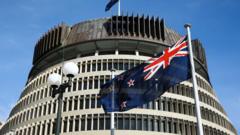A significant protest is underway in New Zealand as thousands gather in Wellington for the culminating event of a nine-day hīkoi aimed at fighting a contentious bill that threatens Māori rights and the Treaty of Waitangi. The hīkoi, inclusive of various communities, reflects widespread discontent with the current government’s policies under Prime Minister Christopher Luxon, altering the balance between indigenous rights and legislative interpretation.
**New Zealand Prepares for Major Māori Hīkoi as Protesters March to Parliament**

**New Zealand Prepares for Major Māori Hīkoi as Protesters March to Parliament**
Thousands unite in Wellington to challenge controversial bill impacting Māori rights.
Thousands of supporters are expected to converge on New Zealand’s capital, Wellington, as the final destination of a transformative nine-day hīkoi—a peaceful march advocating for Māori rights. Set against the backdrop of a controversial bill introduced by the governing coalition, the event marks a crucial moment for activists who argue that the fundamental rights of Māori people are under threat amid increasing political divisions.
Anticipating up to 30,000 participants, local hotels are fully booked, emphasizing the protest's significance. The bill seeks to redefine the 1840 Treaty of Waitangi, seen by many as a cornerstone of race relations in New Zealand. Critics voice concerns that the government’s legislative efforts could dilute the privileges afforded to Māori, a claim that has sparked national debate on the essence of equality within a multicultural society.
One of the bill's proponents, David Seymour, claims that its core intention is to eliminate perceived racial biases in current legislative frameworks, stating, “Your starting point is to take a human being and ask, what's your ancestry?” This sentiment has received backlash as opponents fear it may provoke further racial division rather than foster unity among New Zealand’s diverse population.
Among the rally's supporters, sentiments are mixed. Some express concerns that the Māori community is asking for “more and more,” while others, including co-leaders of the Māori Party, insist that true equality is unattainable as long as indigenous people are marginalized.
This march has revived collective memories of past hīkoi movements, where many activists, including Rose Raharuhi Spicer, emphasize the significance of inclusion, calling the event "the hīkoi of everybody." Preparations include teaching participants the traditional haka, signifying a call for solidarity across ethnic groups.
As the nation awaits this potentially historic gathering, participants like 26-year-old Leah Land articulate a deep connection to the land and a commitment to uphold Māori heritage, indicating an emerging shared identity that transcends racial boundaries. “I want Aotearoa New Zealand to be a safe space for them to exist,” she expressed.
With emotions running high and a rallying cry for unity, this event illustrates the evolving narrative surrounding Māori rights in New Zealand, highlighting a struggle that transcends legislation and enters the realm of cultural legacy.

















